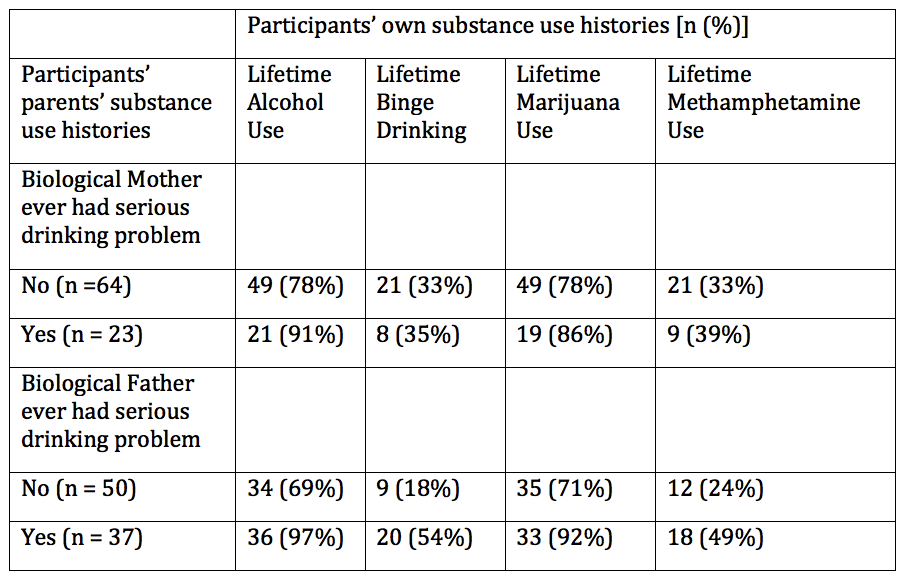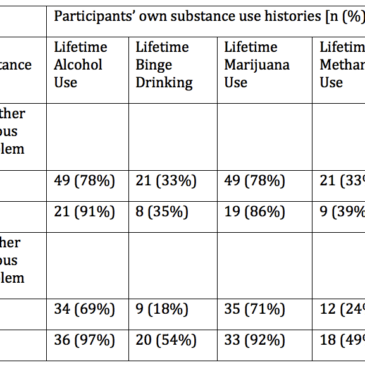Alcohol and drug abuse affects families in many ways. For example, The BASIS previously reported that there is a relationship between pre-natal smoking and ADHD in children, parental drinking behavior is associated with child alcohol consumption, and pre-natal alcohol exposure relates to children’s future alcohol sensitivity. This week, for our special series on Fatherhood and Addiction, we review research that examines fatherhood roles and addictive behavior among young Native American dads (Neault et al., 2012).
Method
- Researchers recruited 87 male partners of teen mothers who were enrolled in a clinical trial that was taking place in three tribal nations in the Southwestern United States.
- Participants completed a survey on fatherhood roles and substance use behaviors.
- Questions included items that addressed socio-demographics, substance use behavior, fatherhood involvement, parental stress, family history of addiction, and more.
- The researchers reported descriptive statistics and associations between familial substance use characteristics and parenting behavior.
Results
- Most (92%) participants reported lifetime alcohol and/or drug use.
- Past 30-day substance use included alcohol (44%), cigarettes (52%), Marijuana (36%), methamphetamines (1%), and crack/cocaine (5%).
- About 44% of participants report no past 30-day substance use.
- Participants’ mothers’ substance use history was not predictive of participants’ own substance use. However, participants were more likely to report lifetime substance use if their own fathers had substance use problems (Table 1).
- For example, over half of participants whose fathers had a serious drinking problem had experienced a binge drinking episode, compared with 18% among those whose fathers never had a serious drinking problem.
- Participants with more extensive substance use histories were less likely to be involved in childcare or child play with their own children.

Figure. Relationship between paternal and maternal drinking problem history and the substance behavior of young Native American dads. Adapted from Neault et al (2012). Note. All comparisons for biological father drinking history were statistically significant, but none were significant for biological mother drinking history. Click image to enlarge.
Limitation
- The representativeness of the participants of Native American young fathers is unclear because they were recruited from a pre-existing study and the response rate for participation in the current study is unknown.
Conclusions
Research suggests that Native American families’ struggles with harmful behaviors, like substance abuse, could relate to the experience of intergenerational trauma (e.g., Evens-Campbell, 2008). This research suggests that fathers’ substance use patterns affect their children’s own substance use behavior, as well as their children’s parenting behavior. As we gain more insight into the multi-generational affects of substance abuse that are universal and culturally specific, we will be able to build targeted prevention and intervention programs.
What do you think? Please use the comment link below to provide feedback on this article.
References
Evens-Campbell, T. (2008). Historical Trauma in American Indian/Native Alaska Communities: A Multilevel Framework for Exploring Impacts on Individuals, Families, and Communities. Journal of Interpersonal Violence, 23(3), 316-338.
Neault, N., Mullany, B., Powers, J., Coho-Mescal, V., Parker, S. Walkup, J., Barlow, A., and the Cradling Our Future and Focus on Fathers Study Teams (2012). Fatherhood roles and drug use among young American Indian men. The American Journal of Drug and Alcohol Abuse, 38(5), 395-402.




